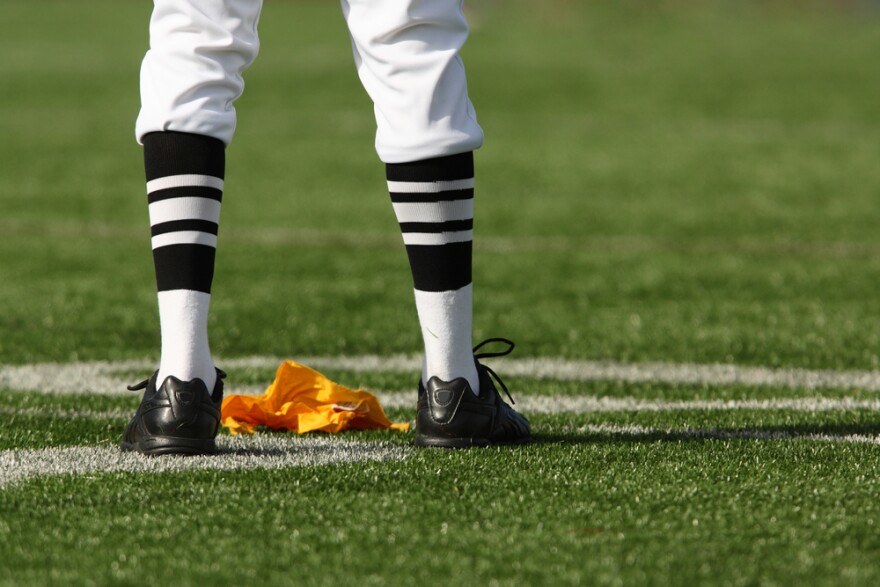Every football fan knows about crime and punishment on the field. You break the rules? You get a penalty. A team of researchers including professors from the University of Texas at Dallas has tried to gauge the link between penalties on the field — and crime off it.
With the NFL playoffs starting this weekend, we caught up with one of those researchers, Alex Piquero, and he sat down with KERA's Rick Holter for this week's Friday Conversation.
Interview Highlights: Alex Piquero...
...On what a criminologist is doing with NFL research stats:
"I've always been motivated by why people do what they do, and why people believe what they believe. And about two years ago there had been a lot of high-profile cases with respect to criminal behavior by NFL players. There was this perception among a lot of the public that crime was running amok among the NFL teams.
"We wanted to see if that was the case. Interestingly enough, USA Today and the San Diego Union-Tribune put together their own database of players who were arrested in the NFL. We took a comparable set of data from the FBI, who publishes criminal statistics in the United States of males ages 20-39, and then we compared the crime rates of the NFL players to the crime rates of that kind of sample. What we found was that the criminal behavioral patterns of the NFL players was actually lower than the criminal behaviors of a comparable set of males 20-39 in the U.S. population."
…On this latest research comparing how players on the field behavior correlates off the field:
"Our motivation there was geared by a lot of work in organizational psychology that looks at what people do in the workplace and then outside the workplace. There's been a lot of research done on doctors, lawyers, police officers about misbehavior in the profession and misbehavior outside of the profession. And so we thought, the NFL keeps very good records that they actually publicly release on penalties on players on the field.
"What we did was, we accessed that data from the NFL archives and we appended the data on the number or penalties and penalty yards in the postseason and in the regular season. We linked the data up with the arrest data file that we had. What we found was that the two things were correlated: Players who had more arrests outside of the field had more penalties on the field and for longer periods of yards. Interestingly enough, we did not find that relationship in the postseason."
…On what the difference is:
"I think, in the postseason several things could be occurring. First, a penalty can not only change the course of the game, but it could end a season. So I think players are on slightly better behavior in the postseason. I also think that referees might be a little less likely to make certain kinds of calls because they could really determine the tide of a game. In hockey, there's this adage about when the score's 2-2 with a minute left, referees put away their whistle. And something could be happening as well in the NFL with respect to that. It's just really interesting that it didn't come out that way."
...On the difference between this season's Dallas Cowboys compared to last year's team:
"Since February 2015, they have not had an arrest of one of their players, according to our database. They are also among the lower parts of the league who are penalized this season. They also happen to be winning a lot. What that all means? We don't know. It's one year. We'll have to see what happens into the postseason, and then into next year.
...On if there's any sense whether this carries through high school and college:
"That's what we're starting to do just now. We're now going back to each of the individual players and going into their college years to tabulate those penalties and penalty yards. The high school stuff will be a little trickier to get because not every high school publicizes that data. We're really excited about that next step."
…On becoming a Cowboys fan:
"In the 1970s, during my period of growing up watching football, the Redskins and Cowboys had the rivalry as everybody knows who was around that time. The biggest rivalry in the world. And so my Dallas Cowboys came onto the field when I watched them play at RFK Stadium because I would go to those games. They came on the field with their white shirts, and I saw Roger Staubach, Ed "Too Tall" Jones, Drew Pearson, Tony Hill, Randy White — and I just fell in love with the team and the star. It's not really good foreign to be a Cowboy fan in Washington D.C. but it was something has followed me over the course of my entire life."







